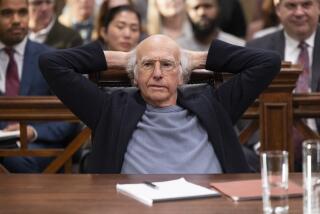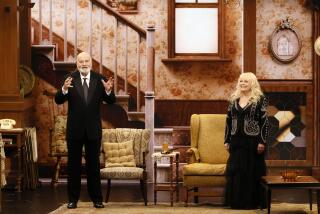Review: On the morning after the end of ‘Mad Men’
There is a human need to account and sum up; to write the obituary on every completed life, an urge toward postmortem analysis that can apply even to television characters, especially now that every drama and most comedies have a serial backbone, an ongoing narrative thrust. “Mad Men,” Matt Weiner’s seven-season, eight-year emotional adventure, concluded its business Sunday night, having told us all it will ever have to tell us about Don and Betty and Peggy and Roger and Joan and Pete and Bert, barring the sequels that ought never to happen. It is for us now to sift these seeming facts.
FULL COVERAGE: Everything “Mad Men”
And yet even now, it would be a mistake to decide too finally about what we have seen. Lives are mysterious even to the people who live them; characters surprise even the people who write them; and it is weak art that only admits to a single workable interpretation. I will be thinking about this show and its endgame for a while; the finale has already changed shape for me, and it is barely half a day old.
Although it involved extraordinary characters living at the edge of melodrama, “Mad Men” was always a show about becoming, about invention, about the choices people make from moment to moment that determine who they are from moment to moment -- the decision to help, to hinder; to tell a truth, or let lie a lie; to say yes, to say no; to stay, to go. That’s what made the show so exciting, even when nothing seemed to be happening; it found a way to make every moment count, with consequences, but without judgment. There are no morals tendered; there is only what happened, what was said. Life and life only.
The dominant mood of the final episode was one of surrender. For all our heroes, Weiner’s parting gift to his characters -- and by extension to us, who loved them, if we loved them -- was to allow them, for a last moment at least, to stop struggling -- to see a truth, recognize their nature, let a little life in, go with a flow, to confess, to accept. It was an orgy of love, reunion and hope -- naive or misplaced, possibly, as never-to-be-revealed subsequent events might reveal -- but real enough for to be going on with.
Even Betty Draper, the finale’s designated fatality -- it was never going to be Don, despite Weiner’s feints in that direction -- gets her dignity (and her daughter) back; you might care to read some wicked irony into the fact that we last see her, without makeup, smoking a cigarette at her kitchen table as she lets herself die from lung cancer, but it felt peaceful and not a little bit lovely to me.
“Mad Men” was always a show couched in and defined by film conventions, beginning with the Douglas Sirk and Doris Day elements of its first season -- it was a polished, carefully worked construction, not a documentary, a show about New York in the 1960s, created by a man too young to really remember them, made in Los Angeles in the 21st century. Appropriately, its end game was a collection of moves from the movies.
Joan’s final crossroads -- to choose the work or the man? -- was something out of an old-fashioned “woman’s film,” with the difference that choosing work was the right decision. Peggy (and, almost incidentally, Stan) went out in a blaze of purest rom-com, lifted to the celestial by Elisabeth Moss’ beautifully modulated, all-in performance; as always, Moss let you know that this story wasn’t just about Don Draper, the man in the series’ first shot and its last.
As for Don, he had been living the last few episodes in an early ‘70s existential road movie, like “Five Easy Pieces” or “Two-Lane Blacktop.” (Indeed, at the beginning of the finale, he was somehow out in Utah, test-driving a car out on the salt flats, as if he had stumbled into that very film.) The trip takes him literally to the edge of the continent, an emotional catharsis and a moment of Zen, in which the emptiness of Don Draper meets the emptiness of the universe. His slowly emerging smile in the last shot is a movie tradition, too -- “City Lights,” “Manhattan,” “Birdman.”
Still, there might be all kinds of things contained in that final smile; is it the enlighened smile of the Buddha, or the grin of the cat who has eaten the canary?
That question runs into and is complicated by the cola coda. Weiner ends the series with an actual commercial, the 1971 “I’d Like To Buy the World a Coke.” It is Weiner’s own “black screen” moment -- he studied with David Chase at “The Sopranos,” after all -- the extra-textual move that casts light back upon the text. On a narrative level, it appears to simply say that Don has an idea, sitting there in his meditation group, and will return to New York and become the fictional author of that ad, the product of McCann-Erickson, the firm from which he’s gone AWOL.
At the same time, it asks us to consider advertising itself, the business that has been the show’s business for all these years. Is it a comment on the way even our hopes and dreams and desires are used against us, judo-like, in order to sell us things that have nothing actual to do with those hopes and dreams and desires? There is something a little horrible in the way the ad plays here -- all this rainbow cheeriness, reducing world peace to the sharing of a soft drink.
And yet the secret of Don’s success as an ad man was that he was never a cynic; he believed the stories he professionally told. Matt Weiner would have been about 6 years old when that ad came on the air, its jingle, with the product written out, spawning a hit single, “I’d Like to Teach the World to Sing.” It may be one of the first songs he remembers, one of the first ads -- the only genuine exercise of nostalgia in a series that took nostalgia as a subject and a method.
ALSO:
‘Mad Men’ finale: Jon Hamm, Matthew Weiner are praised at after-party
‘Mad Men’ cast says goodbye with daylong blowout
See how the women of ‘Mad Men’ transformed on TV’s most feminist show
‘Mad Men’s’ Matthew Weiner greets the end with exhilaration, woe
More to Read
The complete guide to home viewing
Get Screen Gab for everything about the TV shows and streaming movies everyone’s talking about.
You may occasionally receive promotional content from the Los Angeles Times.







